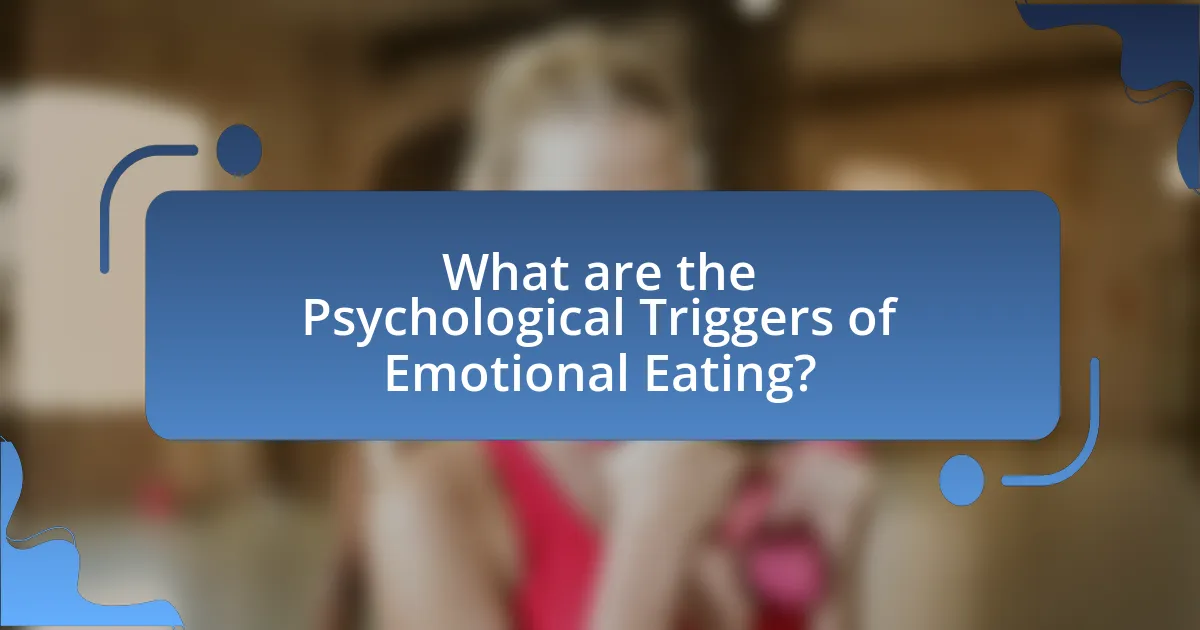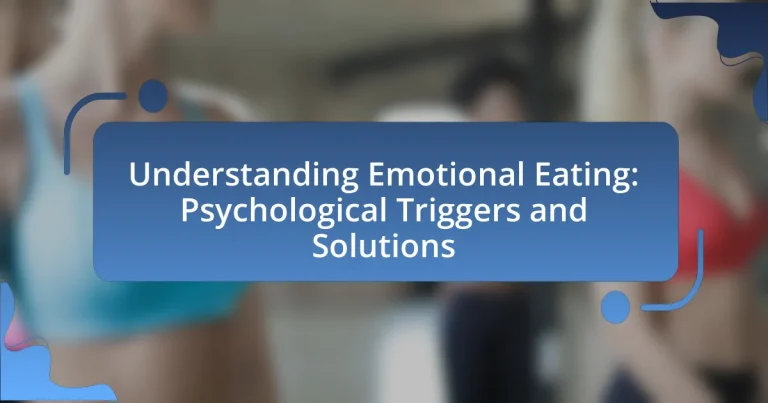Emotional eating is defined as the consumption of food in response to emotional triggers rather than physical hunger, often leading to unhealthy eating patterns and weight gain. This behavior is primarily driven by psychological factors such as stress, anxiety, and sadness, with research indicating that approximately 75% of overeating is linked to these emotional states. The article explores the characteristics of emotional eating, its psychological triggers, and the consequences on both physical and mental health. Additionally, it discusses effective strategies for managing emotional eating, including cognitive-behavioral therapy, mindfulness practices, and lifestyle changes that promote healthier eating habits.

What is Emotional Eating?
Emotional eating is the practice of consuming food in response to feelings rather than hunger. This behavior often occurs when individuals use food as a coping mechanism to deal with emotions such as stress, sadness, or anxiety. Research indicates that emotional eating can lead to unhealthy eating patterns and weight gain, as individuals may choose high-calorie, comfort foods to soothe their emotional distress. Studies show that approximately 75% of overeating is linked to emotional triggers rather than physical hunger, highlighting the significant impact of emotions on eating behaviors.
How is Emotional Eating defined?
Emotional eating is defined as the practice of consuming food in response to emotional triggers rather than physical hunger. This behavior often occurs when individuals use food to cope with feelings such as stress, anxiety, or sadness, leading to a cycle of overeating and emotional distress. Research indicates that emotional eating can be linked to psychological factors, including mood disorders and stress responses, which further validate its definition as a coping mechanism rather than a nutritional necessity.
What are the characteristics of Emotional Eating?
Emotional eating is characterized by consuming food in response to feelings rather than hunger. Individuals often eat to cope with emotions such as stress, sadness, or boredom, leading to a pattern of eating that is disconnected from physical hunger cues. Research indicates that emotional eaters may prefer high-calorie, comfort foods, which can provide temporary relief but may contribute to negative health outcomes over time. Studies show that approximately 75% of overeating is linked to emotional triggers rather than physiological needs, highlighting the significant role emotions play in eating behaviors.
How does Emotional Eating differ from physical hunger?
Emotional eating differs from physical hunger in that it is driven by psychological factors rather than physiological needs. Physical hunger arises from the body’s requirement for nutrients and is characterized by gradual onset, physical sensations like stomach growling, and a focus on specific foods. In contrast, emotional eating is often triggered by feelings such as stress, sadness, or boredom, leading individuals to consume food for comfort rather than sustenance. Research indicates that emotional eaters may experience cravings for high-calorie, sugary foods, which can lead to overeating and weight gain, as highlighted in studies published in the journal “Appetite” by van Strien et al. (2016).
Why do people engage in Emotional Eating?
People engage in emotional eating primarily to cope with negative emotions such as stress, anxiety, and sadness. This behavior often arises because individuals seek comfort and distraction from their feelings through food, which can provide temporary relief and pleasure. Research indicates that emotional eating is linked to psychological factors; for instance, a study published in the journal “Appetite” found that individuals with higher levels of emotional distress are more likely to consume food as a coping mechanism. Additionally, the brain’s reward system is activated when eating, reinforcing the behavior as a way to manage emotions.
What psychological triggers lead to Emotional Eating?
Psychological triggers that lead to emotional eating include stress, anxiety, depression, and boredom. Stress activates the body’s fight-or-flight response, prompting individuals to seek comfort in food as a coping mechanism. Anxiety and depression often result in a desire for quick emotional relief, leading to overeating or cravings for high-calorie comfort foods. Boredom can also trigger emotional eating, as individuals may turn to food for stimulation or distraction. Research indicates that approximately 75% of overeating is linked to emotional triggers rather than physical hunger, highlighting the significant impact of psychological factors on eating behaviors.
How do stress and emotions influence eating behaviors?
Stress and emotions significantly influence eating behaviors by triggering physiological and psychological responses that affect food choices and consumption patterns. When individuals experience stress, the body releases cortisol, a hormone that can increase appetite and cravings for high-calorie foods, often leading to overeating. Research indicates that emotional states such as sadness, anxiety, or boredom can also prompt individuals to seek comfort in food, resulting in emotional eating. A study published in the journal “Appetite” found that individuals with higher levels of stress reported consuming more unhealthy snacks and meals, demonstrating a direct correlation between emotional states and dietary habits.
What are the consequences of Emotional Eating?
Emotional eating can lead to various negative consequences, including weight gain, poor nutritional choices, and emotional distress. Individuals who engage in emotional eating often consume high-calorie, low-nutrient foods, which can result in obesity; research indicates that emotional eaters are more likely to experience weight gain compared to those who eat in response to physical hunger. Additionally, emotional eating can exacerbate feelings of guilt and shame, creating a cycle of negative emotions that further perpetuates the behavior. Studies show that emotional eating is linked to increased levels of anxiety and depression, highlighting its impact on mental health.
How does Emotional Eating affect physical health?
Emotional eating negatively affects physical health by leading to weight gain, obesity, and associated health issues such as diabetes and cardiovascular disease. When individuals consume food in response to emotions rather than hunger, they often choose high-calorie, low-nutrient foods, which can result in excessive caloric intake. Research indicates that emotional eaters are more likely to experience metabolic syndrome, a cluster of conditions that increase the risk of heart disease and diabetes, due to the unhealthy dietary patterns associated with this behavior. Additionally, studies show that emotional eating can disrupt normal hunger cues, leading to a cycle of overeating and subsequent physical health deterioration.
What impact does Emotional Eating have on mental well-being?
Emotional eating negatively impacts mental well-being by reinforcing unhealthy coping mechanisms and contributing to feelings of guilt and shame. When individuals use food to manage emotions, they may experience temporary relief but ultimately face increased anxiety and depression. Research indicates that emotional eaters often struggle with body image issues and low self-esteem, which can exacerbate mental health problems. A study published in the journal “Appetite” found that individuals who engage in emotional eating are more likely to report higher levels of psychological distress, highlighting the detrimental effects on mental health.

What are the Psychological Triggers of Emotional Eating?
The psychological triggers of emotional eating include stress, anxiety, depression, and boredom. Stress often leads individuals to seek comfort in food as a coping mechanism, while anxiety and depression can create a desire for immediate gratification through eating. Boredom can also trigger emotional eating as individuals seek stimulation or distraction through food. Research indicates that emotional eating is linked to negative emotional states, with studies showing that individuals experiencing high levels of stress are more likely to engage in this behavior. For instance, a study published in the journal “Appetite” found that participants with higher stress levels reported increased cravings for high-calorie foods, demonstrating the connection between emotional states and eating habits.
What role do emotions play in triggering Emotional Eating?
Emotions play a significant role in triggering emotional eating by influencing individuals to seek food as a coping mechanism for negative feelings. When experiencing stress, sadness, or anxiety, people often turn to food for comfort, leading to overeating or unhealthy food choices. Research indicates that emotional states can activate the brain’s reward system, making high-calorie foods more appealing during emotional distress. A study published in the journal “Appetite” by van Strien (2018) found that individuals with higher levels of emotional distress were more likely to engage in emotional eating, highlighting the direct correlation between emotions and eating behaviors.
How do feelings of sadness or loneliness contribute to Emotional Eating?
Feelings of sadness or loneliness significantly contribute to emotional eating by triggering a desire for comfort through food. When individuals experience these negative emotions, they often seek solace in eating as a coping mechanism to alleviate their distress. Research indicates that emotional states can influence eating behaviors, with studies showing that people tend to consume more high-calorie comfort foods when feeling sad or lonely. For instance, a study published in the journal “Appetite” found that individuals experiencing negative emotions were more likely to choose unhealthy snacks over healthier options, highlighting the direct link between emotional states and food choices.
What is the connection between anxiety and food consumption?
Anxiety significantly influences food consumption patterns, often leading to emotional eating. Individuals experiencing anxiety may turn to food as a coping mechanism to alleviate stress or discomfort, resulting in increased intake of high-calorie, comfort foods. Research indicates that approximately 40% of individuals with anxiety disorders engage in emotional eating, which can exacerbate anxiety symptoms and lead to a cycle of unhealthy eating behaviors. This connection is supported by studies showing that stress hormones, such as cortisol, can increase appetite and cravings for sugary or fatty foods, further linking anxiety to food consumption behaviors.
How do environmental factors influence Emotional Eating?
Environmental factors significantly influence emotional eating by creating contexts that trigger emotional responses leading to food consumption. For instance, the presence of high-calorie foods in one’s environment, such as in homes or workplaces, can increase the likelihood of consuming these foods during emotional distress. Research indicates that individuals exposed to food cues, like advertisements or food displays, are more prone to emotional eating, as these cues can evoke cravings and emotional responses. A study published in the journal “Appetite” found that environmental stressors, such as noise and crowding, can exacerbate emotional eating behaviors, highlighting the role of situational factors in food choices.
What role does social pressure play in eating habits?
Social pressure significantly influences eating habits by shaping individuals’ food choices and consumption patterns in social settings. Research indicates that people often adjust their eating behaviors to align with those around them, leading to increased intake of unhealthy foods in group situations. For example, a study published in the journal “Appetite” found that individuals are more likely to overeat when dining with others who are also consuming large portions, demonstrating the impact of social norms on dietary decisions. This phenomenon can contribute to unhealthy eating patterns and emotional eating, as individuals may prioritize social acceptance over personal health goals.
How can advertising and food availability trigger Emotional Eating?
Advertising and food availability can trigger emotional eating by creating associations between food and emotional states, leading individuals to consume food as a coping mechanism. Research indicates that advertisements often depict food as a source of comfort or happiness, which can influence emotional responses and cravings. For example, a study published in the journal “Appetite” found that exposure to food advertisements can increase cravings and consumption, particularly in individuals who are already predisposed to emotional eating. Additionally, the availability of highly palatable foods in environments such as homes, workplaces, and stores can further exacerbate this behavior, as easy access to these foods makes it more likely for individuals to turn to eating during times of stress or emotional distress.

What Solutions Exist for Managing Emotional Eating?
Cognitive-behavioral therapy (CBT) is an effective solution for managing emotional eating, as it helps individuals identify and change negative thought patterns related to food and emotions. Research indicates that CBT can significantly reduce emotional eating behaviors by teaching coping strategies and promoting healthier responses to emotional triggers. A study published in the journal “Appetite” found that participants who underwent CBT reported a decrease in emotional eating and an improvement in emotional regulation skills. Additionally, mindfulness practices, such as meditation and mindful eating, have been shown to enhance awareness of hunger cues and emotional states, further aiding in the management of emotional eating.
What strategies can help reduce Emotional Eating?
To reduce emotional eating, individuals can implement strategies such as mindfulness practices, identifying triggers, and developing alternative coping mechanisms. Mindfulness practices, including meditation and deep breathing, help individuals become more aware of their emotional states and the reasons behind their eating habits. Identifying triggers involves recognizing specific emotions or situations that lead to emotional eating, allowing individuals to address these feelings directly rather than turning to food. Developing alternative coping mechanisms, such as engaging in physical activity, journaling, or seeking social support, provides healthier outlets for managing emotions. Research indicates that mindfulness-based interventions can significantly decrease emotional eating behaviors, as shown in a study published in the journal “Appetite” by researchers from the University of California, which found that participants who practiced mindfulness reported lower levels of emotional eating.
How can mindfulness and self-awareness aid in managing Emotional Eating?
Mindfulness and self-awareness significantly aid in managing emotional eating by helping individuals recognize their emotional triggers and differentiate between physical hunger and emotional cravings. Research indicates that mindfulness practices, such as meditation and mindful eating, enhance self-regulation and reduce impulsive eating behaviors. A study published in the journal “Appetite” by Kristeller and Johnson (2005) found that participants who engaged in mindfulness-based interventions reported a decrease in binge eating episodes and improved emotional regulation. This evidence supports the effectiveness of mindfulness and self-awareness in addressing the psychological aspects of emotional eating.
What role does therapy play in addressing Emotional Eating?
Therapy plays a crucial role in addressing emotional eating by helping individuals identify and manage the psychological triggers that lead to this behavior. Through various therapeutic approaches, such as cognitive-behavioral therapy (CBT), clients learn to recognize the emotional states that prompt overeating and develop healthier coping mechanisms. Research indicates that CBT can significantly reduce emotional eating behaviors by teaching individuals to challenge negative thought patterns and replace them with constructive ones. Additionally, therapy provides a supportive environment where individuals can explore underlying issues, such as stress, anxiety, or depression, that contribute to emotional eating, ultimately leading to more effective and sustainable behavioral changes.
How can lifestyle changes support healthier eating habits?
Lifestyle changes can support healthier eating habits by promoting a structured environment that encourages mindful food choices. For instance, regular meal planning and preparation can reduce impulsive eating and increase the likelihood of consuming nutritious foods. Research indicates that individuals who engage in meal planning are more likely to meet dietary guidelines and maintain a balanced diet. Additionally, incorporating physical activity into daily routines can enhance overall well-being and reduce emotional triggers that lead to unhealthy eating. Studies show that exercise can improve mood and decrease stress, which are significant factors in emotional eating. Therefore, adopting lifestyle changes such as meal planning and regular physical activity can effectively foster healthier eating habits.
What dietary adjustments can help mitigate Emotional Eating?
To mitigate emotional eating, individuals can implement dietary adjustments such as incorporating more whole foods, maintaining regular meal patterns, and practicing mindful eating. Whole foods, including fruits, vegetables, whole grains, and lean proteins, provide essential nutrients that stabilize mood and reduce cravings linked to emotional triggers. Regular meal patterns help regulate blood sugar levels, preventing the energy dips that often lead to emotional eating episodes. Mindful eating encourages individuals to focus on their hunger cues and emotional states, fostering a healthier relationship with food. Research indicates that these strategies can effectively reduce instances of emotional eating by addressing both physiological and psychological factors.
How can regular physical activity influence emotional well-being?
Regular physical activity significantly enhances emotional well-being by reducing symptoms of anxiety and depression. Engaging in exercise stimulates the release of endorphins, which are neurotransmitters that promote feelings of happiness and euphoria. Research published in the Journal of Clinical Psychiatry indicates that individuals who participate in regular physical activity experience a 20-30% reduction in depressive symptoms compared to sedentary individuals. Additionally, consistent exercise improves self-esteem and cognitive function, further contributing to a positive emotional state.
What practical tips can individuals use to combat Emotional Eating?
To combat emotional eating, individuals can implement several practical strategies. First, maintaining a food diary helps identify triggers by recording emotions and eating patterns, which can reveal connections between feelings and food choices. Second, practicing mindfulness techniques, such as meditation or deep breathing, can enhance awareness of emotional states and reduce impulsive eating. Third, engaging in regular physical activity not only improves mood through the release of endorphins but also distracts from emotional cravings. Additionally, establishing a structured meal plan can prevent unplanned eating and promote healthier choices. Lastly, seeking support from friends, family, or a mental health professional can provide accountability and guidance in managing emotional eating behaviors. These strategies are supported by research indicating that mindfulness and structured eating can significantly reduce emotional eating tendencies.
How can journaling help in understanding eating patterns?
Journaling can significantly aid in understanding eating patterns by providing a structured way to track food intake, emotions, and triggers associated with eating. This practice allows individuals to identify correlations between their emotional states and eating behaviors, revealing patterns that may not be immediately apparent. Research indicates that self-monitoring through journaling can enhance awareness of eating habits, leading to more mindful eating practices and better emotional regulation. For instance, a study published in the Journal of Nutrition Education and Behavior found that participants who kept food diaries reported improved dietary habits and greater awareness of their eating triggers.
What are some effective coping mechanisms for emotional distress?
Effective coping mechanisms for emotional distress include mindfulness meditation, physical exercise, and journaling. Mindfulness meditation helps individuals focus on the present moment, reducing anxiety and promoting emotional regulation. Research indicates that regular mindfulness practice can decrease symptoms of anxiety and depression (Kabat-Zinn, 1990). Physical exercise releases endorphins, which are natural mood lifters, and studies show that engaging in regular physical activity can significantly improve mental health (Craft & Perna, 2004). Journaling allows individuals to express their thoughts and feelings, facilitating emotional processing and providing clarity, which has been linked to reduced stress levels (Pennebaker, 1997). These mechanisms are supported by empirical evidence demonstrating their effectiveness in managing emotional distress.


